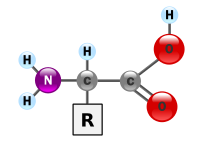
Photo from wikipedia
BACKGROUND A reduction in skeletal muscle strength is a prognostic indicator of negative consequences, such as physical disability, frailty, and mortality in older adults. Studies investigating associations between the risk… Click to show full abstract
BACKGROUND A reduction in skeletal muscle strength is a prognostic indicator of negative consequences, such as physical disability, frailty, and mortality in older adults. Studies investigating associations between the risk of reduction in skeletal muscle strength and the amount of dietary protein which is a factor influenced muscle health are scarce, particularly in Asian populations. Therefore, we investigated the association between the amount and change in daily protein intake and the prospective risk of developing low skeletal muscle strength in middle-aged and older adults. METHODS This study used data from the Korean Genome and Epidemiology Study as an ongoing population-based cohort study of adults aged 40 years and over. The amount of daily protein consumed was assessed using a semi-quantitative food frequency questionnaire. Low skeletal muscle strength was measured with a handgrip strength dynamometer. RESULTS In total, 32,458 adults (11,358 males and 21,100 females) were evaluated. The amount of daily dietary protein consumed was not associated with the risk of low muscle strength over the 4-year follow-up period after adjusting for covariates. No associations between low muscle strength events according to the change in the amount of protein consumed from the baseline to the follow-up surveys were identified. CONCLUSIONS The amount of and change in dietary protein consumed were not associated with developing low muscle strength in middle-aged and older adults. Further studies with a focus on physical activity-protein intake interactions and specific conditions, such as mobility-limited adults or hospitalized patients, are warranted to clarify the relationship between protein intake status and the incidence of low skeletal muscle strength.
Journal Title: Clinical nutrition
Year Published: 2021
Link to full text (if available)
Share on Social Media: Sign Up to like & get
recommendations!